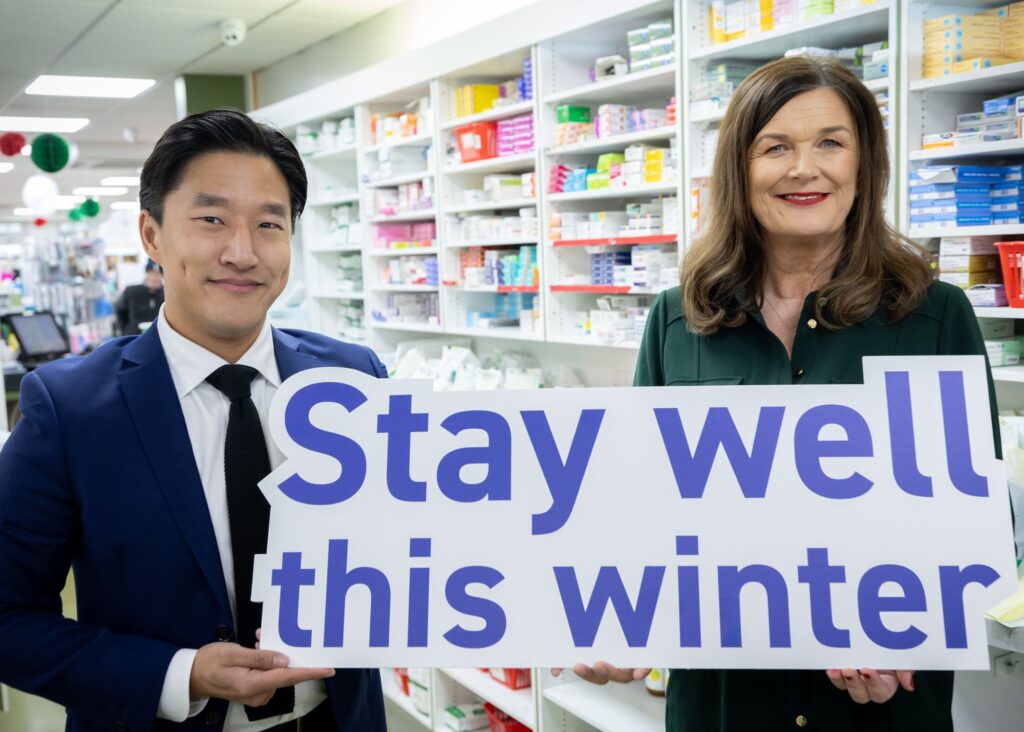Community pharmacies across Northern Ireland are offering advice and support on a wide range of winter illnesses to help us stay well during the colder months.
The Living Well initiative is offered in over 500 pharmacies across Northern Ireland and provides information and advice on public health issues. It is delivered in partnership with the Public Health Agency (PHA), Community Pharmacy NI (CPNI), and the Department of Health (DoH).
The latest Living Well campaign highlights actions you can take to protect your health over the winter months and the support available to you through your community pharmacy. The ‘Stay Well this Winter’ campaign is running in Living Well community pharmacies during December 2024 and January 2025.
Andrew Cheung, Principal Pharmaceutical Officer (Public Health) at the PHA, said: “Winter conditions can be seriously bad for our health, particularly for the more vulnerable members of our community. The ‘Stay Well’ campaign begins on the 1st December, and your pharmacist can provide advice on the steps you can take to prepare for the winter period, such as getting the free flu and COVID-19 vaccines if eligible, ordering repeat prescriptions ahead of the Christmas and New Year period, as well as providing advice on keeping warm and active.”
This campaign aims to help the public prepare for the winter months by encouraging them to plan ahead and take positive steps towards better health by advising them on how to care for themselves, and to visit their pharmacy for advice if needed.

Joanne McMullan, Community Pharmacist at Portaferry Pharmacy, added: “Pharmacists are well positioned in the community to offer advice and support about different health matters that may arise over the winter months. All colds and most coughs, sinusitis, earache and sore throats get better without antibiotics. You should take your pharmacist or GP’s advice and only take antibiotics when you need them. Pharmacists can recommend over-the-counter medicines for most minor illnesses, so consider speaking to a pharmacist before going to your GP.”
The following steps can help you stay well this winter;
- ‘Catch it. Bin it. Kill it’ – carry tissues and use them to catch coughs or sneezes, then bin the tissue.
- Wash your hands – regularly wash your hands throughout the day and hands should always be washed before eating or drinking and after using the toilet.
- Rest up – know when to stay home to stop the spread. If you have a high temperature stay home until you feel better or if you have diarrhoea and/or vomiting, you should stay home for at least 48 hours after the last episode.
- Speak to your pharmacist about over-the-counter remedies and remember antibiotics don’t work on viruses.
- Winter vaccines – if eligible get your COVID-19 booster, flu vaccine and RSV vaccine.
- Keeping warm over winter months can prevent colds, flu and more serious health problems. Wear warm clothes, even indoors if it is cold and heat your main living room to around 18-21ºC (64-70ºF). But it is important to make sure your heating is safe. Install a carbon monoxide alarm to reduce the risk of carbon monoxide poisoning.
- Eat well – food is a source of energy which helps to keep your body warm. Try to make sure you have hot meals and drinks regularly throughout the day.
- Keep active – regular exercise can help improve your physical and mental health, reduce the risk of falls and can be beneficial for recovery if you do get ill.
- Seek support – if you feel down and it affecting your life see www.mindingyourhead.info for advice, if you need more support make an appointment with your GP.
- Look out for others, such as older family members, friends or neighbours, who may need a bit of extra help during winter.
To learn more, pick up a free Stay Well this Winter leaflet in your local participating community pharmacy or speak to a member of the pharmacy team.
For more information on how you can look after yourself and those close to you this winter,’ see www.pha.site/Staywellthiswinter


